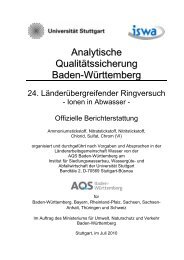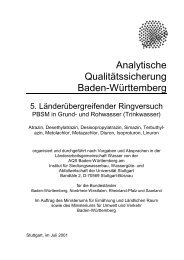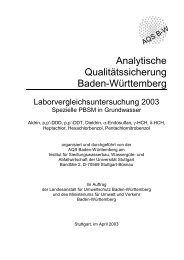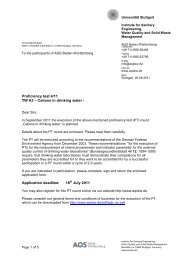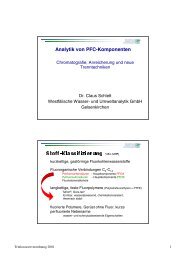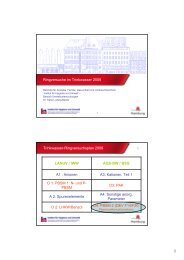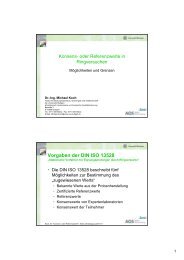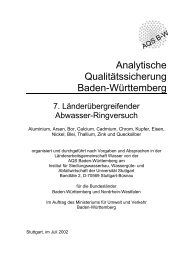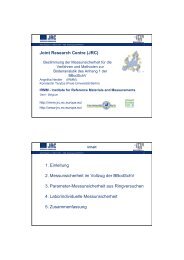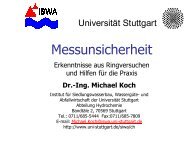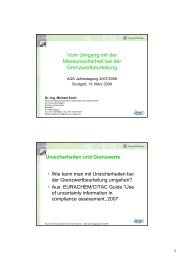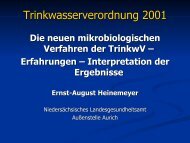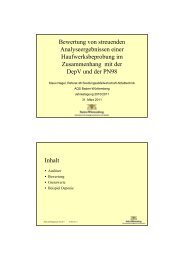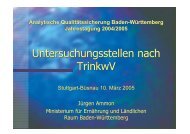Institute for Sanitary Engineering, Water Quality and Solid Waste ...
Institute for Sanitary Engineering, Water Quality and Solid Waste ...
Institute for Sanitary Engineering, Water Quality and Solid Waste ...
You also want an ePaper? Increase the reach of your titles
YUMPU automatically turns print PDFs into web optimized ePapers that Google loves.
Chair of <strong>Waste</strong> Management <strong>and</strong> Emissions<br />
This modular, decentralised system is especially suitable<br />
<strong>for</strong> the application in sensitive areas, e.g. tourism<br />
regions, corral reefs, isl<strong>and</strong>s, coasts, nature parks,<br />
etc.. The demonstration project MODULAARE should<br />
assess whether this modular concept can be operated<br />
economically <strong>and</strong> routinely. There<strong>for</strong>e the tests in the<br />
practical use <strong>and</strong> the integration into the processes<br />
within the tourists resort are of special interest.<br />
Innovative Character:<br />
The innovative character of the MODULAARE concept<br />
can be outlined by the following key points:<br />
• Combination of waste recycling + wastewater<br />
treatment + energy concept<br />
• Modular units can be adapted to extensions of the<br />
hotel<br />
• Decentralised use is possible (bays, little villages<br />
without regular wastewater treatment <strong>and</strong> waste<br />
disposal)<br />
• Development of a sustainable, recycling management<br />
resulting in an nearly waste- <strong>and</strong> wastewater-free<br />
tourists resort.<br />
• By modifying the solid content <strong>and</strong> switching on/<br />
off individual membrane modules the membrane<br />
facility can be adapted very easily to seasonal<br />
fluctuations (guest numbers)<br />
• Advanced development to self-sufficient systems<br />
(e.g. by including other regenerative energy sources)<br />
• Membrane <strong>and</strong> sanitation stage (fermentation)<br />
enable short cycles (no germs, exciter, etc.)<br />
• Altogether, the membrane system will dem<strong>and</strong> low<br />
attention during operation because the settling of<br />
the activated sludge plays a role no more<br />
• Difficulties with wastewater in fermentation facilities<br />
are solved by means of the membrane facility<br />
• Excess sludge problems are solved by fermentation<br />
system<br />
Advantages:<br />
MODULAARE promotes substantially the sustainable<br />
management of both the hotel system <strong>and</strong> the environment.<br />
The largest advantage which can be expected<br />
is the use of the benefits (high-efficient cleaning, recycling<br />
of waste, regenerative energy) of both systems.<br />
Simultaneous the problems determined by the system<br />
(power requirement of the membrane, excess sludge,<br />
fermentation wastewater) will be neutralised. Further<br />
advantages are:<br />
• Avoidance of pollution of high-sensitive ecological<br />
systems (e.g. corral reefs, mud flats, etc.) by insufficiently<br />
treated wastewater<br />
• Discharge to dumps which often indicate insufficient<br />
st<strong>and</strong>ards in tourism regions (methane pro-<br />
duction leachate, setting, hygiene aspects) will be<br />
minimised<br />
• Regenerative energy can be used to save fossil<br />
sources of energy<br />
• The modular system makes extensions simple <strong>and</strong><br />
economically possible (construction, integration<br />
into existing modules etc.)<br />
• Direct water utilisation as process water or <strong>for</strong> irrigation<br />
(substitution of drinking water <strong>and</strong> water<br />
<strong>for</strong> domestic use)<br />
• Depending upon the respective local situation, fermentation<br />
residues can be used directly in agriculture<br />
or be made applicable in hotel gardens by<br />
drainage <strong>and</strong> maturing to compost<br />
• <strong>Water</strong> retention capacity of soils <strong>and</strong> content of<br />
humic substances will be increased by application<br />
of compost<br />
• Preservation of resources (water, artificial fertiliser,<br />
etc.)<br />
• Production of valuable soil-conditioner; saving of<br />
artificial fertiliser (costs), compost contributes to<br />
improve humus generation <strong>and</strong> to increase CO 2<br />
fixation<br />
in the soils (Kyoto Protocol)<br />
• No problems with organically highly loaded fermentation<br />
residues<br />
• Enrichment of ground-water by spray irrigation of<br />
green belts <strong>and</strong> infiltration of the purified waste<br />
• Reduction of environmental pollution as chlorinated<br />
water will not be utilised any more<br />
• Cost saving within the area of water supply <strong>and</strong><br />
wastewater disposal<br />
Description of the demonstration plant:<br />
The demonstration plant, located in Iberotel Sarigerme<br />
Park (Sarigerme, Turkey), consists of the waste<br />
water treatment module (container on the right) <strong>and</strong><br />
the biogas module. This article describes the anaerobic<br />
digestion module.<br />
In this module, organic waste <strong>and</strong> sludge from the<br />
membrane wastewater purification are digested under<br />
anaerobic conditions, while producing biogas <strong>and</strong> anaerobic<br />
digestion residues. The digestate can be used<br />
as an organic fertilizer if tested suitable.<br />
The biogas module comprises the following technical<br />
components:<br />
• Delivery storage tank<br />
• Digester<br />
• Gas storage<br />
• Gas flare<br />
• Storage tank <strong>for</strong> the fermentation output<br />
• Digester input<br />
• Digester Output<br />
• Fermentation residues<br />
82



